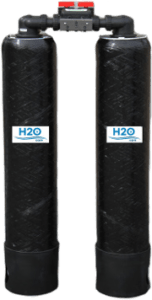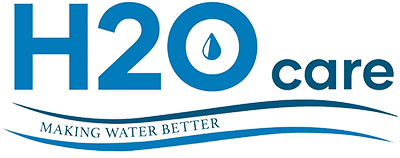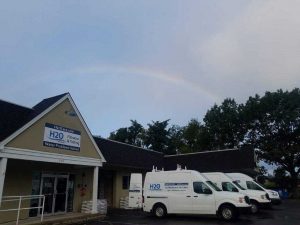PFAS IN WATER
PFOS and PFOA are Perfluorinated compounds (PFCs), (the most commonly used and studied PFAS) are fluorine-containing chemicals with unique properties to make materials stain and stick resistant. Perfluorooctanoic acid (PFOA) is a man-made chemical that is used in the process of making Teflon, although it is burned off during the process and is not present in large quantities in the final product. Teflon itself is not suspected to cause cancer. PFOS or perfluorooctane sulfonate, is a breakdown product of chemicals formerly used to make Scotchgard® products. (For removal of PFAS, see section below)
Because of strong carbon-fluorine bonds, PFOS is stable to metabolic and environmental degradation. PFOS is one of a large group of perfluoroalkyl substances (PFASs) that are used to make products more resistant to stains, grease, and water. These compounds have been widely found in consumer and industrial products, as well as in food items. In 2002 the only major U.S. manufacturer voluntarily agreed to phase out production of PFOS. Exposure in the United States remains possible due to its legacy uses, existing and legacy uses on imported goods, degradation of precursors, and extremely high persistence in the environment and the human body. See EPA link at EPA Advisory Link. Perfluorooctane sulfonate (PFOS) is a manmade chemical in a large family of chemicals called perfluoroalkyl substances (PFASs) (Buck et al. 2011). PFOS has been used in a variety of consumer products, and continues to be used as a fire repellent in firefighting foams, and generated as a degradation product of other perfluorinated compounds. PFOS is very persistent in the environment and the human body; it has been detected in water, wildlife, and humans worldwide.
Water resources contaminated by PFAS have been associated with releases from manufacturing sites, industrial sites, fire/crash training areas, and industrial or municipal waste sites where products are disposed of or applied.
Health Affects- Perfluorinated Compounds In Drinking Water
The health risks of exposure to the chemicals include developmental effects to fetuses during pregnancy or to breastfed infants, cancer, liver effects, immune effects, thyroid effects, and more. Peer reviewed studies indicate that exposure to PFOA and PFOS over certain levels may result in adverse health effects, including developmental effects to fetuses during pregnancy or to breastfed infants (e.g., low birth weight, accelerated puberty, skeletal variations), cancer (e.g., testicular, kidney), liver effects (e.g., tissue damage), immune effects (e.g., antibody production and immunity), thyroid effects and other effects (e.g., cholesterol changes). There is limited information identifying health effects from inhalation or dermal exposures to PFOA or PFOS in humans and animals. 1
Removal of PFAS Compounds In Drinking Water

PFAS Removal System
There are technologies effective in removing PFAS from drinking water, especially Perfluorooctanoic acid (PFOA) and Perfluorooctanesulfonic acid (PFOS), which are the most studied of these chemicals. The most effective technologies include Ion exchange, activated carbon adsorption and reverse osmosis. For more information on removal, see https://h2ocare.com/what-are-pfas/.

Reverse Osmosis Purification System installed under sink. Basement install optional.
Reverse osmosis purification technology utilizes membrane technology to separate pure water from dissolved solids in the water. It is a highly effective drinking water purification also used on a larger scale in ocean desalination plants across the globe. For more on this approach, see PFAS Removal – RO.
- https://www.epa.gov/ground-water-and-drinking-water/drinking-water-health-advisories-pfoa-and-pfos



